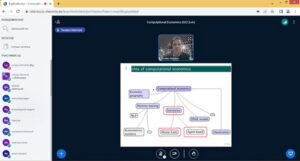Lecture by Prof. Dr. Torsten Heinrich on “Computational Economics” for students of the elective course
On Monday, September 25, an elective course “Computational Economics” (with Python) began for students of the Economic Cybernetics program, prepared in cooperation of the Chemnitz University of Technology (Prof. Dr. Torsten Heinrich, Professor for Microeconomics, Faculty of Economics and Business Administration, Chemnitz University of Technology; Oxford Martin Associate at OMPTEC, Oxford Martin School, University of Oxford; Associate Fellow at the Institute for New Economic Thinking (INET), University of Oxford) and Ivan Franko National University of Lviv (Associate Professor Larysa Zomchak, Department of Economic Cybernetics, Ivan Franko National University of Lviv) and within the project “Chemnitz-Lviv Learning Bridge” (DAAD). 67 students of different courses and levels of higher education registered for the course. During the course, students will have access to pre-recorded video lectures by Prof. Dr. Torsten Heinrich, attend lectures and practical classes in the format of video conferences, and complete practical assignments on computational economics in Python.
On Tuesday, September 26, the students listened to an introductory lecture by Prof. Dr. Torsten Heinrich on “Computational Economics (with Python)” via videoconference, during which they got acquainted with the concept of “computational economics” and its difference from traditional research methods in economics, considered examples of the application of computational economics methods at the macro and micro levels, learned about the features of the computational approach in economics and its branches, discussed the need to use programming in the implementation of computational economic models and, in particular, the feasibility of using the Python programming language.
The students thanked the professor for the opportunity to listen to the course «Computational Economics” and for the interesting lecture.
Students have an opportunity to receive certificates upon successful completion of the optional course “Computational Economics” (with Python)





